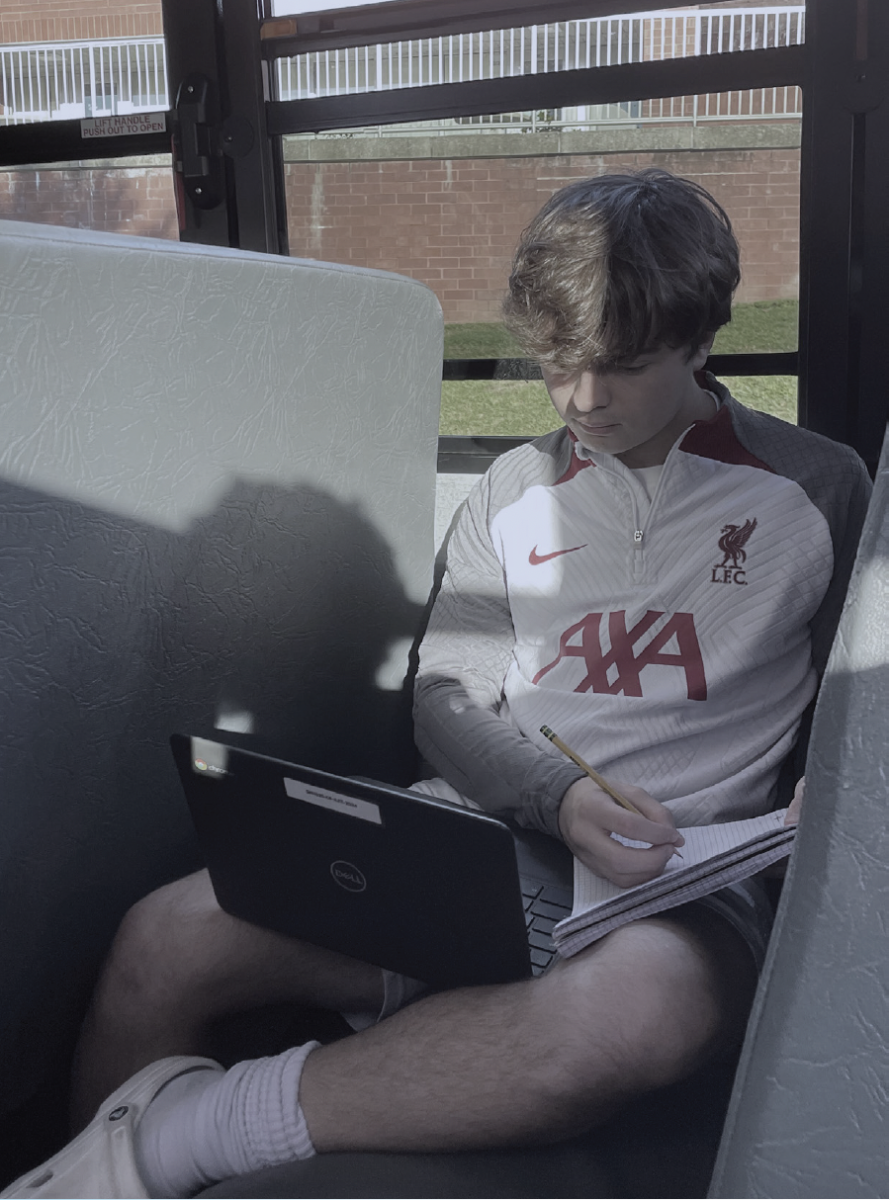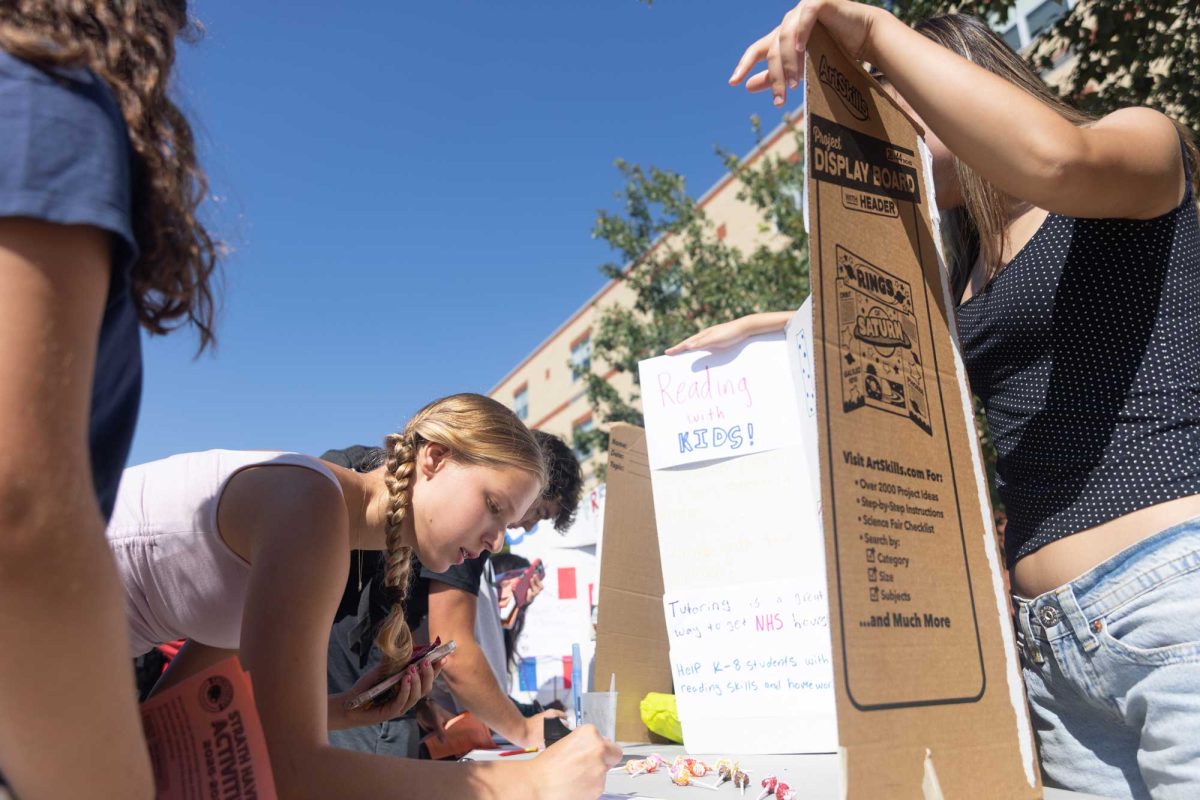Homework vs. Everything Else

Imagine going to school five days a week and following this schedule:
Beginning at 7:35 in the morning, you spend nearly seven hours in school and receive plenty of work to do from your teachers when you get home.
After the end of four 80-minute classes, you go to chorus or band where you spend an hour-long fifth block practicing music for another graded class.
Then, after 3 p.m., you head out for two or three hours of sports practice.
You come home physically exhausted. But you still have several hours of homework ahead— assignments and studying that last until you fall asleep.
Then, you get up the next morning to start the process all over again.
To many Strath Haven students, this tiring schedule will sound familiar.
On one hand, freshman Missy Rich is the sort of student described in the published school profile. As a ninth grader, she is “extremely active in the arts, athletics, clubs, and extracurricular activities.” She is on the cross country team, participates in the Camerata chorus group, and is a member of Haven’s marching band.
On the other hand, she is exhausted.
“It’s really hard because I’m never resting,” she said. “As soon as I get home from practice and band, I have homework until I’m going to sleep, basically.”
Created in 2001, the Wallingford-Swarthmore School District’s homework policy states in general terms how homework should be assigned and distributed each day, and how homework should affect a student’s personal life and health.
WSSD’s policy states that homework should: 1) Provide practice and reinforcement of skills already presented by the teacher 2) Broaden areas of interest through enrichment 3) Provide opportunities for parents to know what their child is studying and 4) Encourage parent and child interaction.
The policy also states that homework “should not interfere with the proper development of the student’s health, nor should it interfere with the student assuming responsibilities in the home.”
By contrast, other school districts have policies that are more in-depth.
For instance, the Radnor School District’s policies base the amount of high school homework on grade level, class, and intention in student learning. West Chester School District’s policy identifies specific testing days for each subject area, and specifically states that homework “shall not be assigned over Thanksgiving and winter breaks.”
According to an optional survey of 265 Strath Haven students at all grade levels, 53.2% of students expressed that they received too much homework for their classes.
Survey results indicate that 58.1% of students have one to two hours of homework each night, while 36.2% of students report three or more hours of homework each night.
“There are some days where the work can be slotted into a small time frame and others where I find myself having to stay up late or cancel my plans to get the work done,” senior Aiden Gold said.
A 2013 Stanford study found that high school students can experience mental and physical health problems, including elevated stress, lack of sleep, and lack of social balance when assigned too much homework.
That study cited research indicating that homework benefits plateau at two hours a night.
Outside of the academic day, extracurricular activities and culture are important to many students. Strath Haven is a host to a variety of arts, sports, music programs, and clubs. The school’s emphasis on getting involved leads to complications when students sometimes face several hours of homework.
“I think it’s really important for students to have an outlet outside of class and I think it’s really important for students to feel like they have a community regardless of where that is,” science teacher Mrs. Kathleen Freeman said. “I worry that when students have too many clubs that they can’t build that community… I do think students are overcommitted, but I think that’s the culture and not the student.”
According to English teacher Mrs. Miriam Drew, the culture of extracurriculars needs to balance with the school’s academic expectations.
“For some students, extracurriculars are the most meaningful part of their day. And it is important to support that,” Drew said. “But if we reach this sort of threshold where the extracurriculars make it impossible for you to do your academic work, the fact remains that the goal of school is the academic work. It seems like that should take priority.”
“Everybody has to know what they can handle, and part of being a teenager is figuring that out,” Drew said.
Drew is a parent of two children who are involved in many sports and clubs, so she experiences the impact of how homework and extracurriculars can sometimes be unbalanced. She said that her daughter often works on homework before and after her athletic practices, and the schedule can be stressful.
“That’s hard, and it stresses her for sure, but we’ve done a lot of work at home,” Drew said. “Maybe we’re lucky because [both parents are] educators, and we have such experiences that help us get perspective, help her organizational skills, make decisions, proactively reach out to teachers, and let them know this is going on.”
Sophomore Vincent Zhu notes that his extracurricular schedule does interfere with his ability to get work done, but that participating in these activities is important to him.
“I think the enjoyment found in these activities can outweigh the added stress of having less time to do homework,” he said.
According to our survey, 60 percent of Strath Haven students report spending one to two hours participating in a school-related activity or school sport each day, while 28.7 percent spend three or more hours engaged in school-related activities.
But many students also participate in activities outside of school, such as club sports, community activities, and employment. Nearly a quarter of survey respondents—24.5%—report three or more hours of outside-of-school activities each day.
This all adds up to a tight squeeze for some students and a major stress factor in their everyday routines. Even students who stated in the survey that their workload is manageable shared that having time to decompress after school is important to them.
“Personally, I’m okay with my workload and am still able to do my activities,” senior Liang He said. “But there are still times I feel overwhelmed at the amount of time it takes me to do my work and often do it in class to pass time so I can just come home and relax.”
Counselor behavioral therapist Mrs. Marlena O’Kane is a proponent of homework because she believes it helps students to retain information and boost their skill.
However, she also believes that balance is important.
“[If] teachers, counselors, administrators, and even activity coordinators and moderators understood, in any student’s life, everything that they had or we all communicated about everything that a particular student was responsible for, it might open some eyes to say, ‘There are only so many hours in a day,’” she said.
For students headed to college, learning how to balance homework and extracurriculars can still feel like a balancing act. Students who participated in several extracurriculars in high school may find it more challenging to juggle extracurricular involvement with challenging classes.
Mr. David Griffith is a first-year adviser at the University of Notre Dame. In his role, he provides support to new students in making the switch from high school to college. He noted how college freshmen often face challenges with overscheduling outside of their classes.
“Students really want to be involved in things, and they’re used to being involved in maybe three or four extracurricular activities, and that’s not sustainable,” he said.
From Griffith’s perspective, the correlation of assignments, activities, and health in high school relates directly to the transition process into college and adapting to a new environment.
“I think what most students find is that things that worked for them in high school aren’t necessarily going to work the same way for them in college,” he said. “The pace of courses goes a little faster and the expectations go up.”
Griffith provided some tips to manage the struggle to balance homework and extracurriculars.
“I would prioritize academics first,” he said. “Here’s my schedule: How much time do I need in order to be sufficiently prepared for each of my classes? My advice to students is to try to do a little bit every day, and that means sitting down with a calendar.”
When the majority of students believe they face too much homework to support their learning, the high school may need to take additional steps to ensure an equal balance of homework, student well-being, and extracurriculars.
“I think homework needs to be meaningful and when it’s given, it should have a purpose,” Freeman said. “I don’t know if it’s feasible with the culture we have right now at Strath Haven to assign homework every night in every class.”
According to Drew, homework should provide a chance to practice and reflect.
“You don’t just give it to give it,” she said. “Is this going to provide practice with this skill? Is this going to allow a student to reflect? That’s what guides my decisions more than anything else.”
Drew aims to keep the homework for her AP Seminar class under 45 minutes a night.
“It’s true, if every one of our four classes gave 45 minutes worth of homework, that’s an awful lot of homework,” she said. “But I don’t think every single one of your classes does that. We should do a study.”
In the meanwhile, students continue finding strategies to maintain their busy schedules.
“I do get homework every single day,” freshman Missy Rich said. “It makes me a lot more tired because I’m losing sleep over homework. You just have to work hard and get it done.”
“Sleep on the weekends,” a nearby friend chimed in.
Lavanya Dixit ’27 and Claire Salera ’27 contributed reporting.
Our fundraiser provides readers with the opportunity to boost our award-winning student journalism team. We are hoping to attend the National High School Journalism Convention in November 2025, as well as to print additional color pages in the 2025-2026 school year. Contributions also allow us to cover website hosting costs, fund staff training, and purchase equipment. Thank you for considering a donation!












